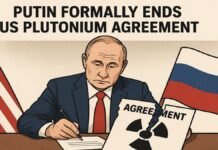
Key Points
- Lieutenant General Yaroslav Moskalik, a senior Russian military leader, was killed by a car bomb in Balashikha, just outside Moscow.
- The attack coincided with US envoy Steve Witkoff’s visit to Moscow for Ukraine war peace negotiations.
- No group has claimed responsibility; the method mirrors previous assassinations of Russian officials linked to the Ukraine conflict.
- The explosion was caused by a powerful IED packed with shrapnel, killing at least one other person and injuring several.
- On the same day, Russian drone attacks in Ukraine’s Pavlohrad killed three civilians, including a child, and injured at least 14.
Moscow: A powerful car bomb killed Lieutenant General Yaroslav Moskalik, a top Russian military official, in the Moscow suburb of Balashikha on Friday, in a targeted attack that has sent shockwaves through Russia’s security establishment. The blast occurred as Moskalik, 59, deputy head of the General Staff’s Main Operations Directorate, was passing a parked Volkswagen Golf, which detonated with enough force to send debris flying and shatter windows in nearby buildings.
Explosion Details and Immediate Aftermath
Russian authorities confirmed that the explosion was triggered by a homemade improvised explosive device (IED) packed with shrapnel, estimated to contain over 300 grams of TNT. The device was placed in the parked car outside Moskalik’s residence and detonated as he walked by. Security footage captured the moment of the blast, showing the vehicle erupting in flames as Moskalik approached.
At least one other person died in the explosion, and several bystanders were seriously injured. Emergency services and forensic teams quickly cordoned off the area, launching a criminal investigation into what Russian officials have labeled a “terrorist attack.” No suspects or groups have claimed responsibility so far.
Pattern of Targeted Killings
The assassination bears striking similarities to previous attacks on Russian officials, particularly those involved in military operations in Ukraine. In December, Lieutenant General Igor Kirillov was killed by a bomb concealed in an electric scooter outside his Moscow apartment—a killing for which Russian authorities blamed Ukrainian intelligence. The latest attack on Moskalik comes amid a series of high-profile assassinations targeting Russian military and pro-Kremlin figures since the invasion of Ukraine began in 2022.
Timing: Attack Coincides with Critical Peace Negotiations
The bombing occurred just hours before US President Donald Trump’s special envoy, Steve Witkoff, arrived in Moscow for a new round of peace talks with President Vladimir Putin. The discussions are focused on brokering a ceasefire in the ongoing Ukraine war, with both sides under international pressure to reach an agreement. Russian Foreign Minister Sergey Lavrov reiterated Moscow’s willingness to finalize a deal, though key issues remain unresolved.
Ukrainian Drone Strikes Kill Civilians
Meanwhile, violence continues on the Ukrainian front. On the same day as the Moscow bombing, Russian drone strikes on the Ukrainian city of Pavlohrad in the Dnipropetrovsk region killed three people including a child and a 76-year-old woman and injured at least 14 others, several of them children. The attack, which set a residential building ablaze and damaged local infrastructure, was part of a broader overnight barrage involving over 100 drones launched across five Ukrainian regions.
Ongoing Investigations and Heightened Tensions
Russian investigators are treating Moskalik’s assassination as a homicide and terrorism case, deploying forensic experts and law enforcement to analyze the blast site. The attack has heightened security concerns in Moscow and underscored the vulnerability of even high-ranking officials.
No group has claimed responsibility, and Russian authorities have not publicly named suspects. However, the method and timing of the attack have fueled speculation about Ukrainian involvement, especially given the pattern of similar killings since the war escalated.
The killing of Lieutenant General Moskalik marks a dramatic escalation in the shadow war playing out inside Russia, as diplomatic efforts to end the Ukraine conflict continue. The dual tragedies in Moscow and Pavlohrad highlight the persistent dangers facing both military leaders and civilians amid the ongoing conflict.




















































